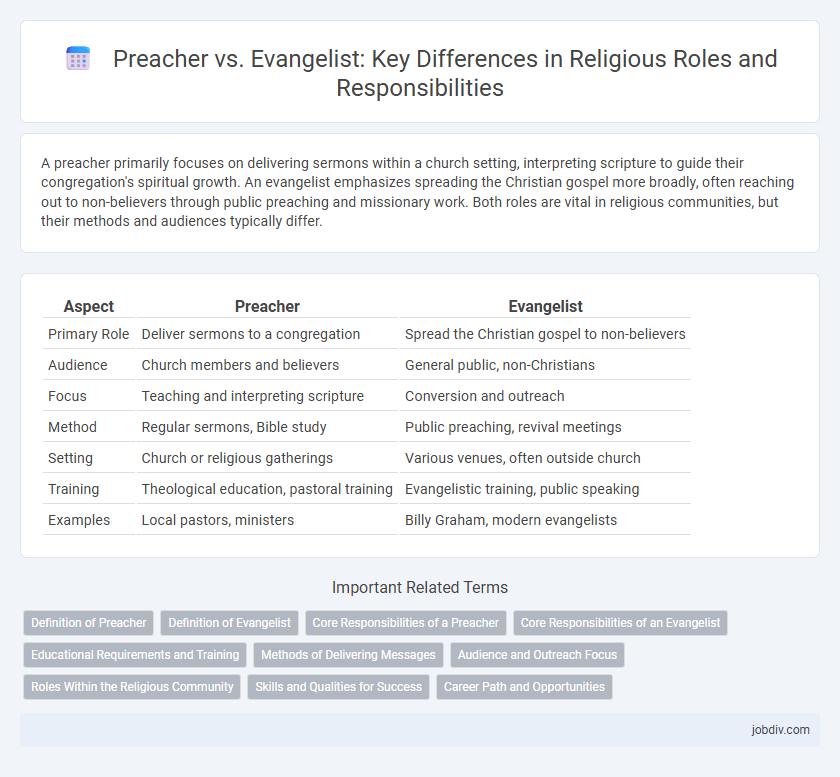A preacher primarily focuses on delivering sermons within a church setting, interpreting scripture to guide their congregation's spiritual growth. An evangelist emphasizes spreading the Christian gospel more broadly, often reaching out to non-believers through public preaching and missionary work. Both roles are vital in religious communities, but their methods and audiences typically differ.
Table of Comparison
| Aspect | Preacher | Evangelist |
|---|---|---|
| Primary Role | Deliver sermons to a congregation | Spread the Christian gospel to non-believers |
| Audience | Church members and believers | General public, non-Christians |
| Focus | Teaching and interpreting scripture | Conversion and outreach |
| Method | Regular sermons, Bible study | Public preaching, revival meetings |
| Setting | Church or religious gatherings | Various venues, often outside church |
| Training | Theological education, pastoral training | Evangelistic training, public speaking |
| Examples | Local pastors, ministers | Billy Graham, modern evangelists |
Definition of Preacher
A preacher is a religious leader who proclaims and interprets sacred texts, delivering sermons to inspire and instruct a congregation. The role primarily involves teaching doctrine, guiding moral behavior, and fostering spiritual growth within an established faith community. Unlike an evangelist who focuses on conversion and outreach, a preacher emphasizes ongoing religious education and worship.
Definition of Evangelist
An evangelist is a specific type of preacher who primarily focuses on spreading the Christian gospel to non-believers and encouraging conversion through public preaching and personal testimony. Unlike a general preacher who may teach, interpret scripture, or provide pastoral care, an evangelist's core mission centers on outreach and evangelism, often targeting unreached communities or individuals. The role of an evangelist is pivotal in missionary work, revival meetings, and outreach ministries aimed at expanding the church through active proclamation of salvation in Jesus Christ.
Core Responsibilities of a Preacher
A preacher primarily focuses on delivering sermons that interpret scripture to inspire and instruct the congregation in faith and moral living. Core responsibilities include preparing biblical messages, fostering spiritual growth, and addressing the religious needs of the local community. Preachers often emphasize teaching doctrine, encouraging worship, and providing pastoral care within a church setting.
Core Responsibilities of an Evangelist
Evangelists focus on spreading the gospel and converting individuals through public preaching, personal witness, and outreach programs. Their core responsibilities include traveling to unreached areas, organizing revival meetings, and equipping new believers for spiritual growth. Unlike preachers who primarily minister within established congregations, evangelists emphasize mission work and expanding the church's influence.
Educational Requirements and Training
Preachers often undergo formal theological education, such as degrees in divinity or ministry, typically from accredited seminaries or Bible colleges to deepen scriptural knowledge and pastoral skills. Evangelists may receive specialized training focused on outreach methods, public speaking, and evangelism strategies, often through practical ministry experiences rather than extensive formal education. Both roles require continuous study of scripture, but preachers generally emphasize theological scholarship while evangelists prioritize techniques for effective communication and conversion.
Methods of Delivering Messages
Preachers primarily deliver messages through structured sermons focusing on biblical exposition within established church services, emphasizing doctrinal teaching and spiritual application. Evangelists utilize dynamic, spontaneous methods such as outdoor rallies, personal testimonies, and mass crusades to engage diverse audiences and inspire conversions. Both employ persuasive communication, but evangelists prioritize outreach and immediate response, while preachers foster ongoing spiritual growth within a congregation.
Audience and Outreach Focus
Preachers primarily address a congregational audience within established churches, emphasizing doctrinal teaching and spiritual edification. Evangelists focus on reaching unchurched or nonbeliever populations through dynamic, persuasive outreach events aimed at conversion. The distinction lies in preachers nurturing faith within the community, while evangelists actively seek to expand it beyond traditional church boundaries.
Roles Within the Religious Community
Preachers primarily focus on delivering sermons and interpreting scripture to provide spiritual guidance within established congregations. Evangelists specialize in spreading the faith and converting non-believers, often conducting outreach events and revival meetings outside traditional church settings. Both roles complement each other by fostering spiritual growth and expanding the religious community.
Skills and Qualities for Success
Preachers excel in delivering structured, doctrinal sermons with deep theological knowledge, commanding strong public speaking skills and the ability to interpret scripture effectively. Evangelists possess a dynamic, relational approach, emphasizing persuasive communication, interpersonal skills, and the ability to inspire immediate spiritual decisions. Success in both roles requires unwavering faith, emotional intelligence, and the capacity to connect meaningfully with diverse audiences.
Career Path and Opportunities
Preachers often pursue careers within established churches, focusing on pastoral duties, sermon preparation, and community leadership, which offer long-term stability and potential advancement to senior clergy roles. Evangelists typically engage in outreach and missionary work, traveling to spread religious messages and facilitate conversions, presenting opportunities for global impact and involvement with various ministries. Career paths for preachers lean toward institutional leadership, while evangelists frequently experience dynamic roles with broader geographical and cultural engagement.
preacher vs evangelist Infographic

 jobdiv.com
jobdiv.com